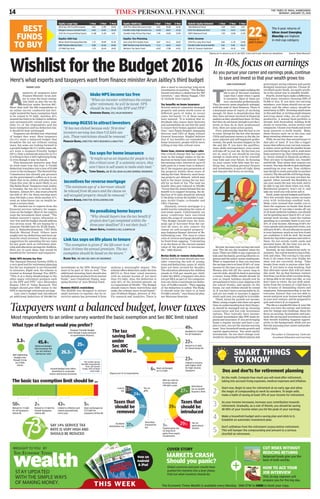The document is a financial newsletter that provides information on mutual funds and retirement planning. It includes the following:
1) A table showing the 1, 3, and 5 year returns of various mutual funds across categories like large cap, mid cap, multi cap, tax planning, hybrid, and debt funds. The 5-year returns of Mirae Asset Emerging Bluechip mid-cap fund are the highest at 22.35%.
2) Suggestions from financial experts for the upcoming budget, including raising tax exemption limits and introducing a separate limit for equity-linked savings schemes (ELSS) funds.
3) Ten ideas for beneficial tax and investment changes, such as making the National Pension System (
